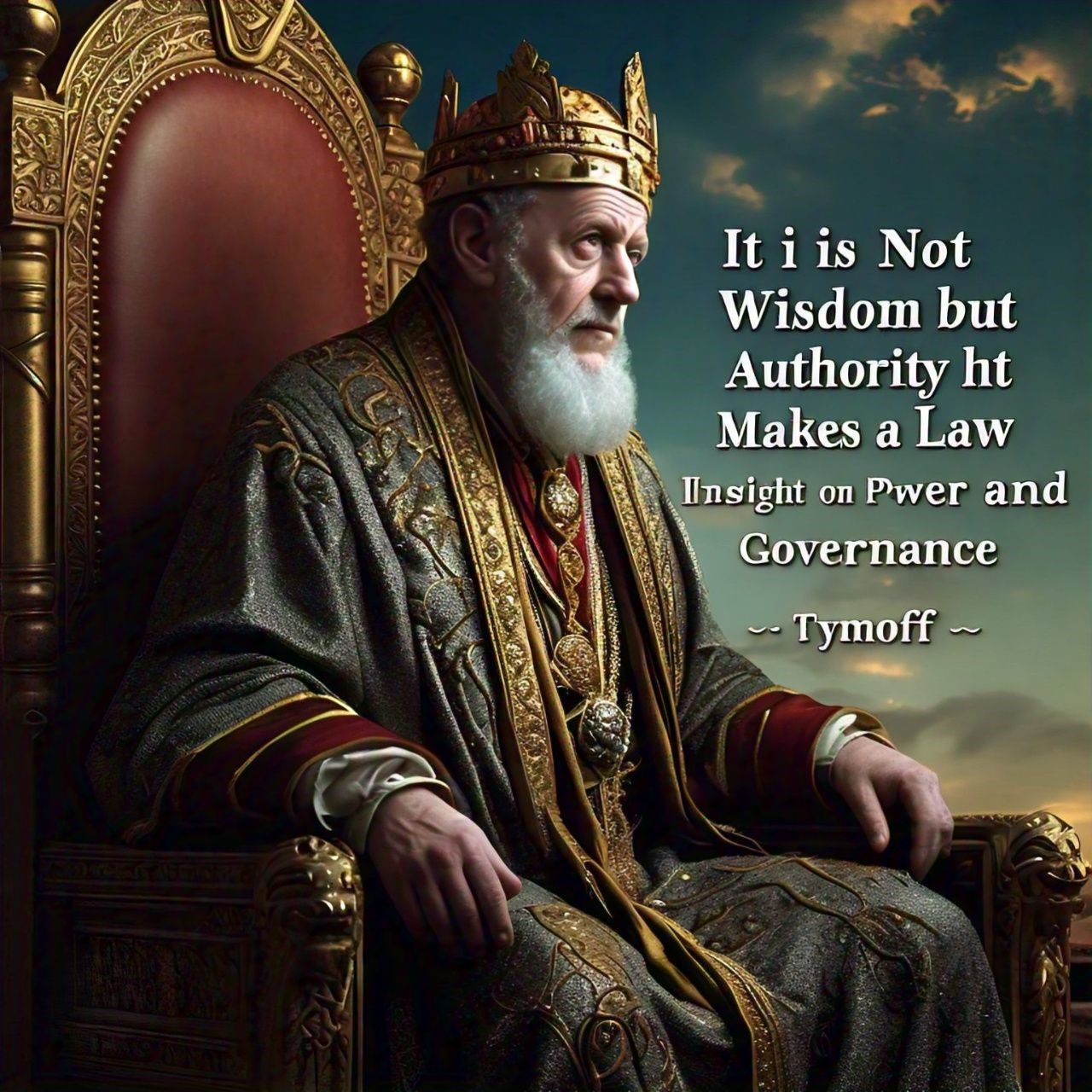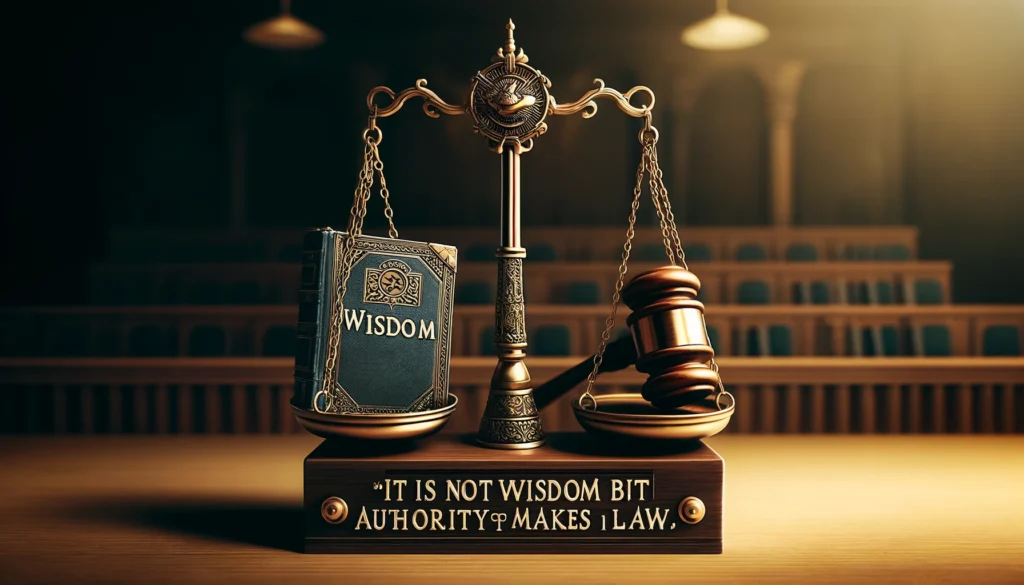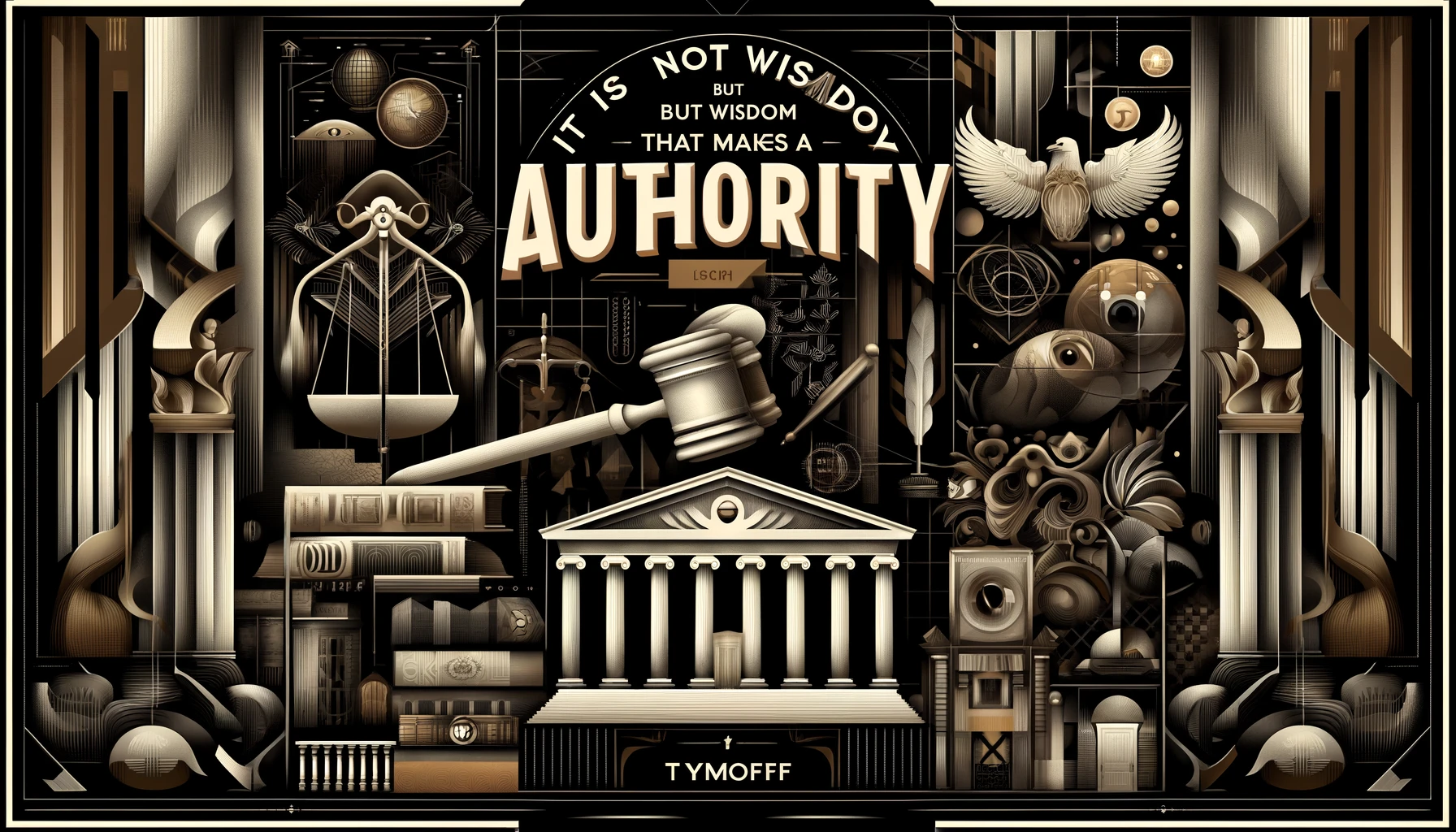Law
It is Not Wisdom but Authority That Makes a Law. T – Tymoff: Insight on Power and Governance

Introduction to the quote and its relevance in today’s society
Laws shape our lives in significant ways. They govern our actions, protect our rights, and define the boundaries of acceptable behavior. Yet, have you ever stopped to think about what truly gives these laws their power? T – Tymoff’s thought-provoking quote, “It is Not Wisdom but Authority That Makes a Law. T – Tymoff,” challenges us to examine this question. In today’s society, where debates on justice and fairness rage, understanding the role of authority in lawmaking becomes essential. As we navigate through complex issues like social inequality and governance failures, we must ask ourselves: Are we following rules set by those in power or striving for a just system guided by wisdom? Let’s dive deeper into how authority influences laws and explore the delicate balance needed for a fair society.
“It is Not Wisdom but Authority That Makes a Law. T – Tymoff”
The quote “It is Not Wisdom but Authority That Makes a Law. T – Tymoff” resonates deeply in today’s political climate. It illuminates the often stark reality of governance.
Authority, rather than wisdom, tends to shape our legal frameworks. It can lead to laws that reflect power dynamics instead of moral or ethical considerations.
When authority reigns supreme, questions arise: Who truly benefits? Are these laws serving justice or merely enforcing control?

Historical examples illustrate this point vividly. Many unjust laws stem from those wielding power without regard for equitable principles.
A society ruled solely by authority is at risk of both stagnation and oppression. The absence of wisdom in lawmaking creates gaps where fairness should thrive.
In contrast, incorporating wisdom into governance could foster empathy and understanding—a crucial balance in crafting just legislation.
The role of authority in creating and enforcing laws
Authority serves as the backbone of any legal system. It is through established power that laws are created and enforced. Without authority, there would be no framework to govern society.
Governments wield this authority, often stemming from democratic processes or historical precedence. They craft regulations meant to maintain order and promote societal welfare. However, these laws can vary significantly based on who controls power.
Enforcement is equally crucial. Law enforcement agencies carry out these directives, ensuring compliance among citizens. Their role is pivotal in translating legislation into action, sometimes leading to misunderstandings about justice versus mere obedience.
The balance between authority and acceptance shapes how societies view their laws. When people feel represented by those in power, they are more likely to comply willingly with rules designed for collective benefit.
Examples of how authority has been used to create unjust laws

History offers numerous instances where authority has crafted unjust laws. One stark example is the apartheid system in South Africa. Institutionalized discrimination was upheld by those in power, enforcing segregation and denying fundamental rights to millions.
Similarly, during the era of Prohibition in the United States, authorities enacted laws that outlawed alcohol consumption. The intention may have been moralistic, but it led to rampant organized crime and a disregard for personal freedoms.
Another troubling case is seen with anti-immigration laws in various countries. Authorities create frameworks that marginalize entire communities based solely on their nationality or ethnicity.
These examples underscore a critical truth: authority can often prioritize control over justice, resulting in severe societal ramifications. Such misuse highlights an urgent need for scrutiny regarding who wields power and how they choose to use it.
The impact of wisdom on governing and lawmaking
Wisdom plays a crucial role in effective governance and lawmaking. It transcends mere authority, guiding leaders to consider the broader implications of their decisions.
When wisdom is paramount, laws reflect compassion and understanding. This thoughtful approach fosters trust between the government and its citizens.
Leaders who prioritize wisdom often engage with diverse perspectives. They listen actively to communities and ensure that laws are just and relevant to people’s lives.

Moreover, wise governance encourages transparency and accountability. When decision-makers act with integrity, they inspire confidence among those they serve.
Wisdom becomes even more essential in times of crisis or uncertainty. Influential leaders use it to navigate complex challenges while safeguarding societal values.
By valuing wisdom alongside authority, societies can create a legal framework that promotes harmony rather than discord.
How power can be misused in governance
Power can easily corrupt those who wield it. When authority is concentrated in the hands of a few, accountability often fades. Leaders may prioritize their interests over public well-being, leading to decisions disregarding justice.
Misuse of power manifests in various ways. It might look like unjust policies that target specific groups or favoritism towards certain businesses. It not only erodes trust but also perpetuates inequality within society.
Moreover, disenfranchisement occurs when laws are created without input from the people they affect. Citizens feel powerless and ignored, which fuels discontent and division.
History has shown us countless instances where leaders abused their positions for personal gain or oppressive measures. The consequences ripple through communities and generations long after the initial act of injustice is committed. A balance must be sought; otherwise, governance risks becoming a tool for oppression rather than empowerment.
Alternative approaches to creating fair and just laws

Alternative approaches to creating fair and just laws often emphasize inclusivity and community engagement. By involving diverse voices in the legislative process, we can better reflect the needs of all citizens. It means holding public forums or town hall meetings where individuals from various backgrounds share their perspectives.
Collaborative lawmaking models also gain traction. These encourage partnerships between lawmakers, experts, and affected communities to ensure that proposed regulations are thoroughly vetted for fairness.
Moreover, restorative justice offers a fresh perspective on how laws can be shaped around healing rather than punishment. This approach emphasizes reconciliation over retribution, aiming to repair harm while addressing systemic inequalities.
Utilizing technology plays a vital role, too. Online platforms enable broader participation in policymaking by making it easier for citizens to voice opinions and contribute ideas directly.
Such innovative strategies illustrate that law creation doesn’t have to rely solely on authority but can flourish through collective wisdom and shared responsibility instead.
Conclusion: The importance of balancing authority and wisdom in governance for a better society
The interplay between authority and wisdom shapes the fabric of our governance when we acknowledge that “It is Not Wisdom but Authority That Makes a Law. T – Tymoff,” we are reminded of the potential pitfalls of allowing unchecked power to dictate laws without thoughtful consideration.
History has shown us numerous instances where authority alone creates unjust systems. These examples emphasize the urgent need for wisdom in lawmaking—a perspective grounded in ethics, justice, and a genuine understanding of people’s needs.
To cultivate a fair society, seeking an equilibrium between authority and wisdom is crucial. Laws should not merely be products of power but reflections of moral responsibility and collective well-being. Striking this balance can lead to more equitable legislation that serves all members of society rather than just those at the helm.
Fostering dialogue around these concepts will ensure that future governance remains anchored in authority and enriched by insight and compassion. The aim should always be to create laws that uplift humanity while safeguarding against tyranny.
Explore TodayFirstMagazine and be the first to know current news updates to stay caught up.






